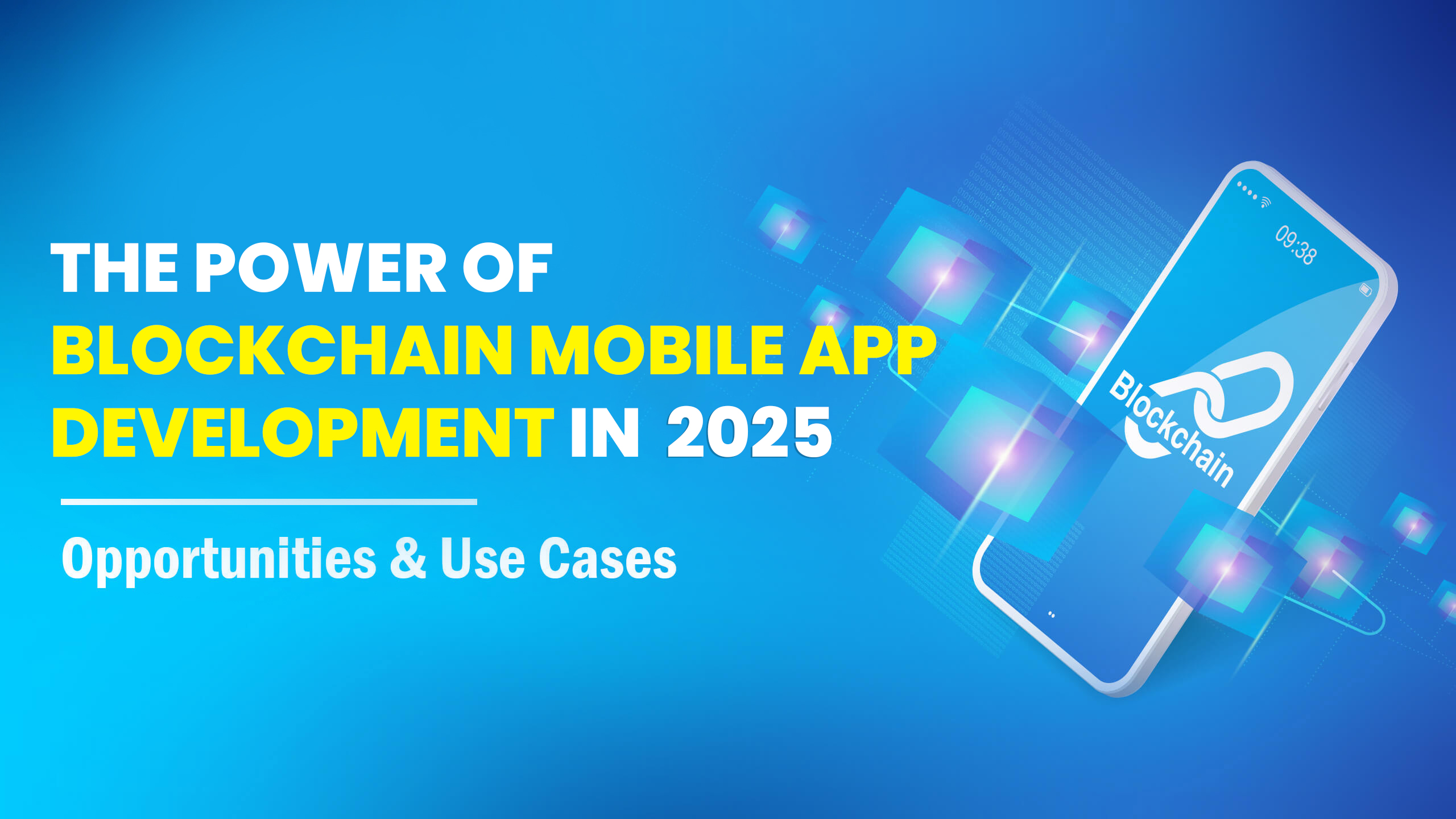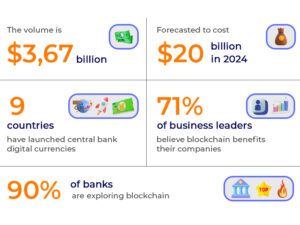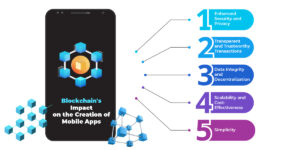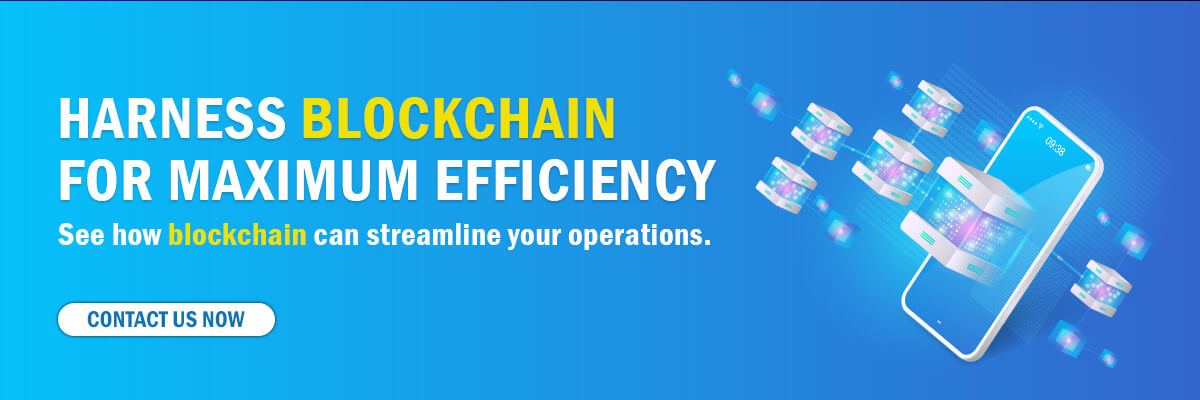Blockchain mobile applications can be primarily designed to run on mobile devices that are driven by blockchain technology. These apps use the main property of blockchain immutability to provide safer transactions, transparent accounting, and increased privacy. Blockchain mobile app development has the potential to facilitate direct communication between users without the involvement of third parties and enhance data privacy and security against fraud.
There are several use cases for blockchain mobile apps, from currencies and decentralized finance (Defi) to supply chains and digital identities. Blockchain mobile applications are the future of mobile applications because such applications can help to improve trust and efficiency in digital dealings.
Blockchain Mobile App Development Growth Forecast for 2025
Market Size: The global blockchain mobile app development market is projected to grow from $7 billion in 2023 to over $15 billion by 2025, driven by demand for secure, decentralized applications in various industries like finance, healthcare, and supply chain management.
Annual Growth Rate: Blockchain technology in mobile app development is expected to see an annual growth rate (CAGR) of over 30% from 2023 to 2025 as businesses prioritize data security and transparency.
Sector Adoption: By 2025, 80% of banking apps and over 60% of supply chain applications are predicted to integrate blockchain solutions, enhancing trust and operational efficiency.
Blockchain’s Impact on the Creation of Mobile Apps
There are various programs for blockchain technology in different industries, and the market for such a generation is growing around the world. This upward push in demand shows simply how critical it is for blockchain application development services to gain familiarity with the blockchain era.
-
Enhanced Security and Privacy
The first major benefit of blockchain mobile app development is that it is more secure and private. The decentralized way in which blockchain improves security is that the data is not stored in one location, therefore eliminating the risk of hacking and leaking. Each transaction or ledger entry is encrypted and linked to the previous one in a way that makes the system almost impossible to hack. This makes blockchain mobile apps ideal in situations where the utmost security is required.
-
Transparent and Trustworthy Transactions
The blockchain Android app development also allows transparent and trustworthy transactions. With traditional networks, some intermediaries have to confirm transactions, thus leading to delays, and errors or simply scams. Blockchain eliminates such intermediaries by using smart contracts – computerized contracts where specific terms of the agreement are reflected in the code. This will make all the transactions traceable and also make the transactions trigger only when conditions have been met, which will help the users trust each other.
-
Data Integrity and Decentralization
Blockchain means there is a reduced likelihood of power and risk concentration because there are no intermediaries and direct transacting with each other is possible. The decentralized design also helps maintain data security and reliability.
Controlling with blockchain implies using consensus mechanisms to validate transactions and keep a legitimate record. It also assists in the authentication of the data that is being sent through the program to prevent third-party access.
-
Scalability and Cost-Effectiveness
Blockchain lowers transaction costs and does away with the middlemen seen in conventional payment systems. Blockchain is especially appealing for applications that need frequent transactions or microtransactions because of its cost-effectiveness.
Scalability concerns are being resolved by blockchain technology improvements, opening the door for widespread use of blockchain-based applications. Blockchain is now more feasible for large-scale applications because of scalability enhancements that allow for larger transaction throughput.
-
Simplicity
Blockchain can be useful in streamlining the several procedures required to ensure security. In the past, technology was extremely complicated to operate, which meant it took a lot of time and work. But now that Blockchain technology has been included in the creation of Android mobile applications, things are much easier than they were before. Along with these improvements in dependability and usability, it also lowers maintenance costs.
Evaluate the Possible Uses of Blockchain Mobile App Development in Different Sectors
Blockchain technology was initially presented as the infrastructure basis for digital money, but today it is used for many other purposes. Blockchain’s decentralized, irreversible, and transparent properties make it suitable for a wide range of applications across several industries.
-
Blockchain Mobile Wallets
Blockchain mobile wallets are one of the first blockchain applications in the financial sector. These offer the users a platform that is free from any form of control and where the users can store, send, and receive digital assets such as cryptocurrencies. Mobile wallets that are run on blockchain ensure customers total control of their money and eliminate third parties like banks from accessing the money. Also, blockchain mobile wallets have additional security options, such as two-factor authentication and encryption, making this choice suitable for those who prefer safekeeping digital money.
-
Decentralized Marketplaces
Decentralized marketplaces with integrated blockchain technology are transforming e-commerce by enabling direct trade between customers and sellers without middlemen, reducing costs, and lowering fraud risk. These platforms ensure transaction transparency and immutability, fostering trust and global economic participation. Additionally, the decentralized app (DApp) market is projected to grow by 40% across mobile platforms as users seek greater control over data and transactions, enhancing security and equality. Together, blockchain-powered decentralized marketplaces and DApps are reshaping digital interactions and empowering individuals worldwide.
-
Supply Chain Management
Blockchain android app development for supply chain management is a new technology that is revolutionizing the supply chain due to its enhanced visibility and traceability across the supply chain. It involves the incorporation of mobile applications to capture every deal and movement of items on a shared ledger wherein all involved parties are capable of tracking the origin and destination of the products.
Such openness is also useful in fighting problems like fakes, injustices, and supply-chain problems. Moreover, blockchain-based supply chain management systems increase the collaboration between participants and facilitate regulatory and quality governance.
-
Smart Contracts
Smart contracts are another essential use of blockchain technology that refers to self-executing contracts where the terms of the agreement are encoded in code that is used in mobile applications in different spheres. These smart contracts are electronic and executable business logic that facilitates business dealings between parties without the involvement of third parties. Blockchain mobile app development uses smart contracts for functions ranging from insurance claims to real estate deals to supply chain management.
-
Healthcare
In the realm of health care services, there are emerging blockchain mobile applications that are coming to redefine how patient information is captured, accessed, and used. Through the use of blockchain technology, these apps offer an efficient and encrypted system for storing and sharing patients’ personal information without compromising privacy and security. Additionally, healthcare applications based on blockchain technology grant patients complete ownership of their medical records and permit sharing them with healthcare professionals when necessary, ensuring their privacy and security.
-
Identity Management
Blockchain android app development is revolutionizing digital identity management and authentication. With worries about data security and privacy growing, blockchain provides a decentralized method of safely storing and controlling digital identities. Without depending on centralized authority, these applications let users choose to share information, keep control over their data, and authenticate themselves. Blockchain-based identity management solutions offer an impenetrable and interoperable foundation for identity verification across many platforms and applications.
Conclusion
The integration of blockchain generation into mobile app improvement unlocks a realm of possibilities across numerous sectors. From enhancing transparency in supply chains to revolutionizing financial transactions, Web 3.0 India, a leading blockchain mobile app development company, offers progressive solutions with an immense ability to reshape traditional strategies and use significant change.







